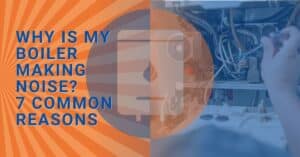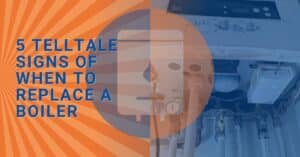Key Takeaways
- Boiler problems often stem from low pressure, leaks or system failures, which could result in inadequate heating or a lack of hot water in your home.
- Common boiler faults can usually be diagnosed through recognisable symptoms. However, it’s always advisable to enlist the services of a Gas Safe registered engineer for a professional evaluation and repair.
- Addressing common boiler issues promptly can prevent costly damages and ensure your home remains warm and comfortable throughout the year.
There’s nothing quite as disruptive as a boiler breakdown, especially during those chilly winter months when we rely heavily on our heating systems. Whether it’s the inconvenience of having no hot water or the discomfort of a cold home, boiler problems can be incredibly frustrating.
We understand the distress that such issues can cause, and that’s why we’re here to help. Rest assured, by the end of this comprehensive guide, you’ll gain a better understanding of the most common boiler faults, their causes, and possible solutions, putting you back in control and easing your concerns.
Should I Turn My Boiler Off if it Has a Fault?
When a boiler fault is detected, it’s often wise to switch off the appliance until a professional can inspect it. Continuing to operate a faulty boiler might lead to more severe damage, or even risk safety.
If your boiler starts emitting any unusual smells or odours you should switch it off immediately and consult a Gas Safe registered engineer as soon as possible. Now, let’s look at some of the most common boiler problems.
1. Leaks
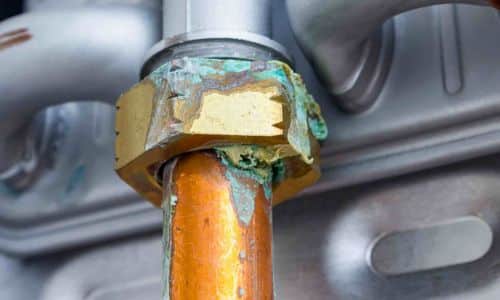 A leaking boiler is a common problem that can result from various issues, such as a broken internal component, like a pump seal or pressure valve. If the leak is coming from the pressure valve, it could be due to the boiler pressure being too high.
A leaking boiler is a common problem that can result from various issues, such as a broken internal component, like a pump seal or pressure valve. If the leak is coming from the pressure valve, it could be due to the boiler pressure being too high.
A leak from the pump seal might suggest that it’s worn out and needs replacing. On the other hand, if the boiler is leaking around the pipes or tank, it may indicate corrosion or a poor installation.
Solution
Addressing a boiler leak involves replacing the faulty component or seal. Regular boiler servicing can help detect leaks and prevent them before they develop into a significant issue, but we do not recommend attempting this kind of fix yourself – leave it to a professional boiler engineer.
2. Boiler Pressure Too Low
Low boiler pressure is another frequent issue that could lead to central heating failure. The boiler pressure should ideally sit between 1 and 2 on the pressure gauge, according to most manufacturers’ instructions.
A sharp, sudden drop in boiler pressure could indicate a more significant problem, like water leaks or cold patches on radiators, which might require bleeding. You can increase the boiler pressure yourself if you feel confident doing so, but don’t hesitate to contact an engineer for assistance.
Solution
Raising the boiler pressure involves opening the filling loop to allow more water into the system. Once the pressure is restored, close the loop. If the pressure keeps falling, it could indicate a leak, which will need professional repair.
3. Boiler Pressure Too High
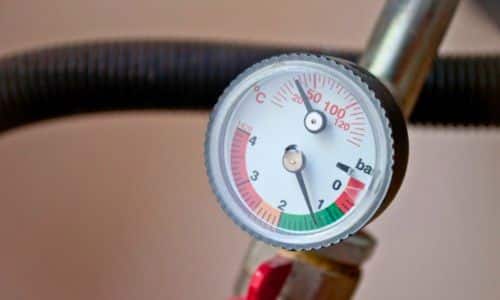 On the other end of the spectrum, excessively high boiler pressure is also problematic. This condition could strain the boiler’s internal components, leading to potential damage and malfunctions. The cause might be as simple as having too much water in the system, which is an easy fix.
On the other end of the spectrum, excessively high boiler pressure is also problematic. This condition could strain the boiler’s internal components, leading to potential damage and malfunctions. The cause might be as simple as having too much water in the system, which is an easy fix.
However, if the high pressure persists after draining excess water, it’s best to contact a professional to investigate further.
Solution
Lowering high boiler pressure usually involves bleeding your radiators or reducing the water in the system. If this doesn’t work, a faulty relief valve or an issue with the expansion vessel might be to blame, both of which will require a Gas Safe registered engineer to address.
4. Hot Water But No Heat
A combi boiler problem you might encounter is having hot water but no heat. This issue could result from various factors, including thermostat troubles or low boiler pressure. However, if your thermostat is fine and the boiler pressure is high enough, there might be a fault requiring professional repair.
For example, a broken diverter valve in a combi boiler system could cause this problem. The diverter valve directs the hot water to either the radiators or the hot water outlets. If it gets stuck, you might end up with hot water but no heating, or vice versa.
Solution
Resolving this problem often requires the replacement of the diverter valve or addressing the specific component causing the issue, such as the thermostat. A Gas Safe registered engineer should inspect and repair such issues.
5. Heat But No Hot Water
 Conversely, you might find your home adequately heated but devoid of hot water. This situation could arise from a lack of fuel reaching your property, incorrect thermostat settings, a frozen condensate pipe, or low boiler pressure. In older boilers, the issue might also result from the pilot light going out, preventing the boiler from activating.
Conversely, you might find your home adequately heated but devoid of hot water. This situation could arise from a lack of fuel reaching your property, incorrect thermostat settings, a frozen condensate pipe, or low boiler pressure. In older boilers, the issue might also result from the pilot light going out, preventing the boiler from activating.
Solution
The possible solutions include replacing the thermostat, thawing the condensate pipe, adjusting the boiler pressure, or relighting the pilot light. More complex issues may necessitate professional intervention.
Is your boiler acting up or failing to keep your home warm?
6. Boiler is Kettling
If you notice a strange rumbling noise similar to a kettle boiling, your boiler could be “kettling”. This noise is caused by limescale or sludge building up on your boiler’s heat exchanger.
The issue is more common in areas with hard water, but it can affect boilers in soft water areas too. It causes your boiler to work harder, costing more to run and potentially shortening the system’s lifespan.
A Gas Safe registered engineer can flush out your system to remove the build-up, restoring your boiler to proper operation.
Solution
Regular descaling and power flushing can prevent kettling from occuring in the first place. In persistent cases, it might be necessary to install a water softener or scale reducer. For severe cases of kettling you should have a Gas Safety registered professional carry out a Power Flush of your system.
7. Boiler Keeps Switching Off
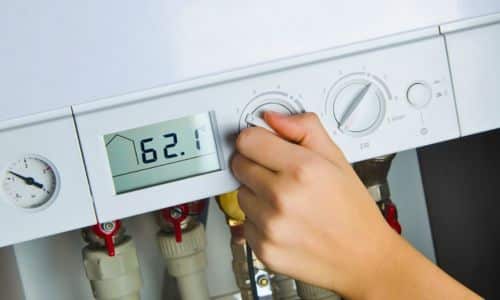 If your boiler keeps turning off by itself, the root cause could be low boiler pressure, thermostat issues, lack of water flow due to a closed valve, pump malfunction or a build-up of sludge within the system.
If your boiler keeps turning off by itself, the root cause could be low boiler pressure, thermostat issues, lack of water flow due to a closed valve, pump malfunction or a build-up of sludge within the system.
If the thermostat is functioning correctly and the boiler pressure aligns with the manufacturer’s instructions, it’s time to call in a professional.
Solution
Regular descaling and power flushing can prevent kettling from occuring in the first place. In persistent cases, it might be necessary to install a water softener or scale reducer. For severe cases of kettling you should have a Gas Safety registered professional carry out a Power Flush of your system.
8. Boiler Won’t Respond to Thermostat
If your boiler isn’t responding to the thermostat, several issues might be at play. It could be that the thermostat has run out of charge or isn’t connected to the internet (in the case of smart thermostats). Alternatively, the temperature settings or daily schedules might be preventing the heating from coming on.
Solution
Possible fixes include charging or replacing the thermostat’s batteries, ensuring the thermostat’s connection to the internet, or adjusting temperature settings or schedules. If none of these work, it may indicate a deeper issue with the boiler or the thermostat, which will require professional inspection.
9. Frozen Condensate Pipe
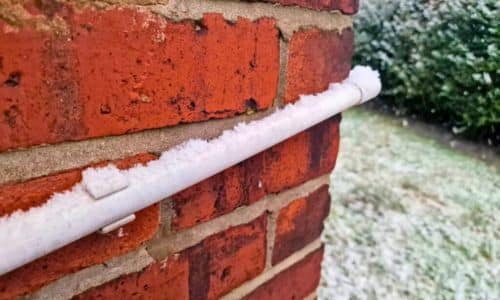 Condensing boilers can have issues with their condensate pipe freezing. This pipe leads acidic water, produced as the boiler operates, away from the unit and down a drain. Many condensate pipes are external to the property, making them susceptible to freezing during cold weather.
Condensing boilers can have issues with their condensate pipe freezing. This pipe leads acidic water, produced as the boiler operates, away from the unit and down a drain. Many condensate pipes are external to the property, making them susceptible to freezing during cold weather.
To prevent this from happening, your heating engineer might recommend lagging the pipe, which involves wrapping it with insulation.
Solution
If the condensate pipe has already frozen, you can try to defrost it by applying warm (not boiling) water to the pipe. This method, however, provides a temporary fix. For a more permanent solution, you might need to consider relocating the pipe to an internal location or insulating it effectively.
10. Cold Radiators
If your radiators are cold, even when your heating is on, it could indicate a problem with your boiler or central heating system. The issue might be caused by air trapped in your system or a build-up of sludge and rust particles.
This build-up, also known as “radiator sludge”, can block the pipes and prevent hot water from reaching the radiators. This problem is often indicated by radiators being cold at the top but warm at the bottom.
Solution
Bleeding your radiators can release the trapped air, improving their efficiency. However, if your radiators remain cold at the bottom after bleeding, it suggests sludge build-up. In this case, a professional power flush of the system might be required to remove the blockage and restore heat distribution.
11. Pilot Light Keeps Going Out
 If your boiler’s pilot light keeps going out, it could be due to a broken thermocouple, a draught blowing the pilot light out, a deposit build-up in the pilot light, or a problem with the gas supply.
If your boiler’s pilot light keeps going out, it could be due to a broken thermocouple, a draught blowing the pilot light out, a deposit build-up in the pilot light, or a problem with the gas supply.
Solution
Relighting the pilot light is often the first step to take. However, if it keeps going out, it might be time to call in a Gas Safe registered engineer. They can replace a faulty thermocouple, shield your boiler from draughts, clean the pilot light, or check for issues with the gas supply.
Conclusion
Regular boiler maintenance can prevent many of these common boiler problems from occurring. However, if you do encounter a fault, don’t panic. Understanding the root cause of the issue can help you decide whether to try a simple fix or call a professional.
Always remember that safety comes first; never attempt repairs beyond your skill level or confidence. If you’re in London and have been experiencing any of the issues above, or something not included on the list and haven’t been able (or don’t want) to fix it on your own, give us a call.
SP Boiler Services are experts in boiler repair and whatever problem you have, we’re here for you.
 by Proud London Home Owners
by Proud London Home Owners



